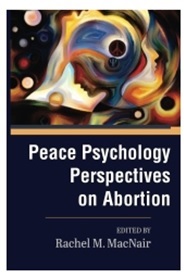Conscientious Objectors
 Excerpt from
Excerpt from
Peace Psychology Perspectives on Abortion
Section of Chapter 14: Differing Perspectives on Specific Populations (pages 234-237)
book edited and this chapter written by Rachel M. MacNair
references turned into links
For centuries, when militaries drafted people, some refused on grounds of conscience. In the 20th century, several nations recognized a legal exemption for conscientious objection, generally allowing people to do other service instead. Now there are countries in which doctors, nurses, and midwives who refuse to participate in abortions are losing licenses or jobs.
Abortion-as-Option Perspective
Global Doctors for Choice funded a supplement issue of the International Journal of Gynecology and Obstetrics devoted to the issue of conscientious objection to abortion. It documents that the world-wide prevalence is extensive, documents harms they understand as arising from this, and argues for a balance for patients’ rights between health workers’ rights.
Fiala & Arthur (2014) believe in no such balance, and published their paper explaining why conscientious objection status should not apply. We quote here from their popular-media summary:
Reproductive health care is the only field in medicine where freedom of conscience is accepted as an argument to limit a patient’s right to a legal medical treatment. It is the only example where the otherwise accepted standard of evidence-based medicine is overruled by faith-based actions. . . . the exercise of conscientious objection (CO) is a violation of medical ethics because it allows health-care professionals to abuse their position of trust and authority by imposing their personal beliefs on patients. Physicians have a monopoly on the practice of medicine, with patients completely reliant on them for essential health care. Moreover, doctors have chosen a profession that fulfills a public trust, making them duty-bound to provide care without discrimination. This makes CO an arrogant paternalism, with doctors exerting power over their dependent patients—a throwback to the obsolete era of “doctor knows best.”
Denial of care inevitably creates at least some degree of harm to patients, ranging from inconvenience, humiliation, and psychological stress to delays in care, unwanted pregnancy, increased medical risks, and death. Since reproductive health care is largely delivered to women, CO rises to the level of discrimination, undermining women’s self-determination and liberty. CO against providing abortions, in particular, is based on a denial of the overwhelming evidence and historical experience that have proven the harms of legal and other restrictions, a rejection of the human rights ethic that justifies the provision of safe and legal abortion to women, and a refusal to respect democratically decided laws. Allowing CO for abortion also ignores the global realities of poor access to services, pervasive stigma, and restrictive laws. It just restricts access even further, adding to the already serious abrogation of patients’ rights. (Fiala & Arther, 2014b).
A similar argument is made by Ben Rich (2015).
Abortion-as-Violence Perspective
Since the abortion-as-violence perspective is that abortion kills a human being, the analogy to conscientious objection in the military is understood to be quite appropriate.
The entire Global Doctors for Choice special issue only mentions once the actual motivation — and words it as a disagreement on when life begins. This is a very tepid and incomplete way of wording the problem.
Fiala & Arthur [quoted above] assert the motivation is to keep women in their traditional roles as wives and mothers and to produce children to be soldiers and citizens of the state. They cite no documentation of this point. Documentation would be difficult to come by. If found, it would likely be in people other than those risking licenses and losing jobs.
Here we have people considering the topic of conscientious objectors at length, yet they do not offer a forthright account of the CO’s actual motivation. This is not what one would expect of people sincerely trying to understand the phenomenon.
Publicized conscientious objectors:

Sweden, Ellinor Grimark

Scotland, Mary Doogan and Concepta Wood

Croatia, Jaga Stojak

New York City, Catherina Cenzon-DeCarlo
======================================================
For more excerpts from Peace Psychology Perspectives on Abortion, see:
Introduction on using multiple perspectives
From Chapter 4, War Causes Abortion
See the list of all our blog posts, put in categories.
One of the definitional issues here is what is health care? Traditionally, medicine was to help people live, and embodied the fundamental principle of “do no harm.” The Hippocratic Oath, the ethical standard of doctors, once specifically prohibited performing abortions. Now proponents of abortion are claiming that killing human beings is health care.
The reason why so-called “reproductive health care” is the only area of medicine where CO status is requested is that it involves killing human beings, the same as other conscientious objection. And it is not really the only area. The other is doctor-assisted suicide, which is also about killing human beings.